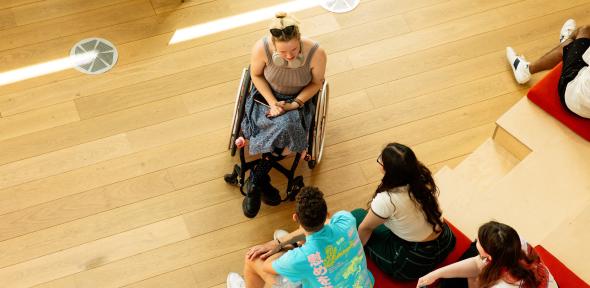
We welcome you to apply to study at Cambridge if you are a disabled student.
We are committed to supporting disabled students - around 25% of our undergraduates have a disability. This includes students with:
- Attention Deficit (Hyperactivity) Disorder – ADHD
- Autism
- Sight loss or those who are blind
- Hearing loss or those who are d/Deaf
- Unseen disabilities and long-term health conditions
- Mental health conditions
- Mobility and physical impairments
- Specific learning difficulties (such as dyslexia and dyspraxia)
If you're thinking about applying to Cambridge
Find out about the location and accessibility
We encourage you to come along to an open day to visit your College, department or faculty before you apply. This is the best way to check where they're located and that they can meet your needs.
You can also find out about building accessibility for each College, department and faculty.
Explore your accommodation options
If you're offered a place, you'll live and socialise at the College that makes you an offer. You'll be a member of your College for the duration of your course.
Decisions about adjustments to accommodation are made by individual Colleges. Before you apply, you should discuss your specific needs with the Colleges you're interested in applying to. You can learn more about accommodation on College websites.
Find out how to choose a College.
If you decide that a particular College meets your specific requirements, we recommend that you apply to that College instead of making an open application.
The Accessibility and Disability Resource Centre (ADRC) will also ask you about any access requirements you may have if you are made an offer.
Tell us about your disability
Our application process is fair, accessible and inclusive. If you're a disabled student, your application will be assessed in the same way as any other application.
Please let us know about your disability in your UCAS application. You can also tell us about your disability at the end of the My Cambridge Application and in your extenuating circumstances information.
Find out more about sharing your disabilities in the UCAS application.
You will be asked about any adjustments you might need for interview (like extra time or rest breaks) at a later stage, so you don't need to submit those as part of your extenuating circumstances information.
The College interviewing you will provide you with a Disability Adjustments form. You should complete it in full. Make sure you return it to the College by the relevant deadline. Contact the College for more information.
It's good to let us know about your disability as early as possible, even if you don't think you'll need any support to begin with. This is the best way to make sure we can support you if:
- you have an interview or take a College admission test during the application process
- you start your course at Cambridge
If you're taking an admission assessment that you need to register for in advance, check the relevant test website to find out how to request adjustments. The deadline for requesting adjustments may be earlier than the test registration deadline.
Already submitted your UCAS application or My Cambridge Application? Don't worry, you can tell us about your disability at any time. You can submit the Disability Adjustments form. If you're made an offer, you can complete the ADRC's Student Information Form.
Ask for alternative document formats
Contact us if you’d like to see the course pages in alternative format.
Get in touch with the Accessibility and Disability Resource Centre (ADRC)
If you disclose your disability in you UCAS application and you're made an offer our ADRC team will get in touch with you before you start the course.
If you're about to start your course, go to the ADRC website to:
- get advice for new students
- find out how to get support with your studies, including exam access arrangements
- find funding and get support with applying for funding
